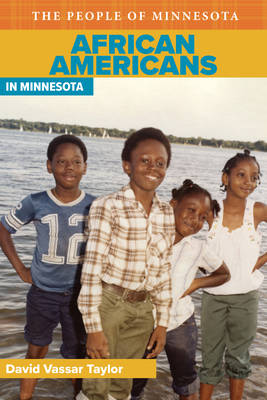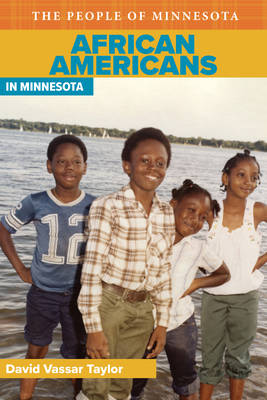
Je cadeautjes zeker op tijd in huis hebben voor de feestdagen? Kom langs in onze winkels en vind het perfecte geschenk!
- Afhalen na 1 uur in een winkel met voorraad
- Gratis thuislevering in België vanaf € 30
- Ruim aanbod met 7 miljoen producten
Je cadeautjes zeker op tijd in huis hebben voor de feestdagen? Kom langs in onze winkels en vind het perfecte geschenk!
- Afhalen na 1 uur in een winkel met voorraad
- Gratis thuislevering in België vanaf € 30
- Ruim aanbod met 7 miljoen producten
Zoeken
€ 24,95
+ 49 punten
Omschrijving
African Americans have had a profound influence on the history and culture of Minnesota from its earliest days to the present. Author David Vassar Taylor chronicles this rich story, using first-person accounts, newspaper articles, and a careful analysis of census records. During the territorial and early statehood periods, Blacks developed communities in St. Paul, Minneapolis, and Duluth, as well as rural areas, and established churches, businesses, and social organizations. Taylor recounts the triumphs and struggles of African Americans over the last two hundred years in a clear and concise narrative. He also introduces influential and notable people including George Bonga, the first African American born in the region during the fur trade era; Harriet and Dred Scott, whose two-year residence at Fort Snelling in the 1830s later led to a famous, though unsuccessful, legal challenge to the institution of slavery; John Quincy Adams, publisher of the state's first Black newspaper; Fredrick L. McGhee, the state's first Black lawyer; social workers Gertrude Brown and I. Myrtle Cardin; labor activist Nellie Stone Johnson; inventor Frederick McKinley Jones; community leaders, politicians, and civil servants including James Griffin, Sharon Sayles Belton, Alan Page, Jean Harris, and Dr. Richard Green; and nationally influential artists including August Wilson, Lou Bellamy, Prince, Jimmy Jam, and Terry Lewis.
Specificaties
Betrokkenen
- Auteur(s):
- Uitgeverij:
Inhoud
- Aantal bladzijden:
- 102
- Taal:
- Engels
- Reeks:
Eigenschappen
- Productcode (EAN):
- 9780873514200
- Verschijningsdatum:
- 1/11/2002
- Uitvoering:
- Paperback
- Formaat:
- Trade paperback (VS)
- Afmetingen:
- 156 mm x 240 mm
- Gewicht:
- 185 g

Alleen bij Standaard Boekhandel
+ 49 punten op je klantenkaart van Standaard Boekhandel
Beoordelingen
We publiceren alleen reviews die voldoen aan de voorwaarden voor reviews. Bekijk onze voorwaarden voor reviews.









